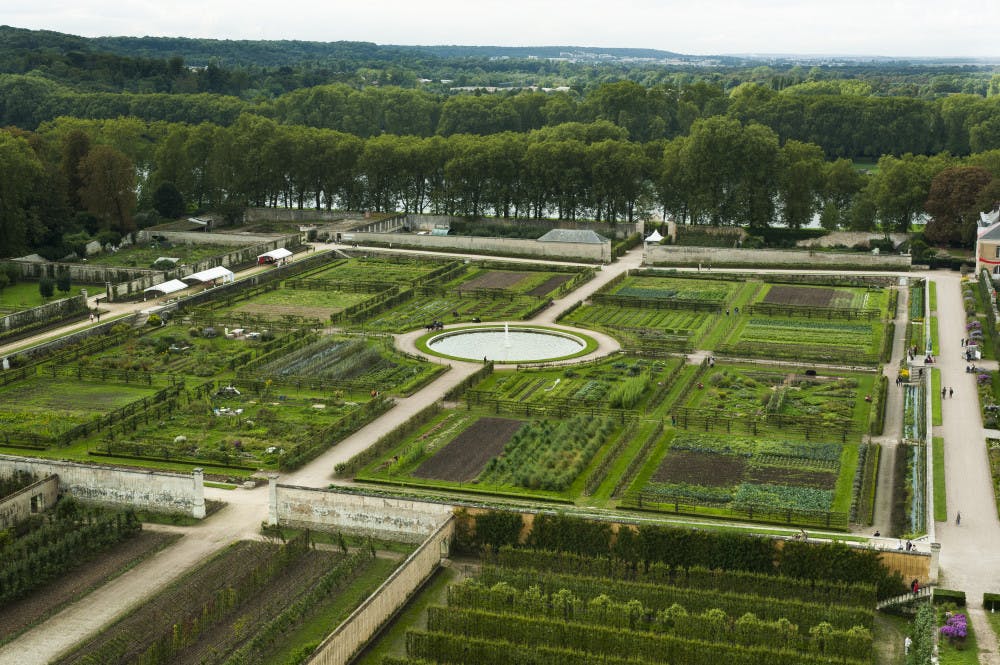Antoine Jacobsohn drew a crowd of students and Providence community members out of the rain and into the Granoff Center for the Creative Arts for his lecture “Sustainable Gardening” Friday. As director of the Potager du Roi — the kitchen garden at the Palace of Versailles — Jacobsohn “has written and edited extensively on the history of French agriculture, on fruits and vegetables in France and on contemporary movements that advocate gardening with, and not against, nature,” said Professor of Literary Arts Cole Swensen in her introduction to the event.
Jacobsohn began the talk by surveying his audience, holding up a small brown package. “Anyone here like lemongrass?” he asked, hands raising as he walked around the auditorium. He passed an audience member the lemongrass packet, another a package of sage and one a bar of chocolate infused with rose and apples — all products from the Potager du Roi. “If you go to a garden, the best thing you can offer is things from the garden,” he said.
Jacobsohn then proceeded to discuss the kitchen garden itself — its identity as both a historic and contemporary space and how this presents challenges for its caretakers.
Promoted to director in 2007, Jacobsohn has since emphasized the garden’s significance as an educational space. “The important part is it’s really inserted in the urban fabric; the other important part is it has become a school. In some sense, I would argue, it has always been a school,” Jacobsohn said, noting that Jean-Baptiste de la Quintinie, who created the Potager du Roi in the late 17th century for King Louis XIV, focused on the garden’s power to educate. In his writings, de la Quintinie even included descriptions of teaching King Louis XIV to prune trees. “Essentially (de la Quintinie) is saying that the garden serves as a place to teach,” Jacobsohn explained. In this spirit, the garden has been home to Ecole Nationale Supérieure de Paysage, the French National School of Landscape Architecture, since 1995.
The garden is known for its pruned fruit trees, grown and woven on terraces so that their branches form intricate shapes, archways and pathways. “Gardens for me are always experiments,” Jacobsohn said, noting how these practices have been maintained with both historic and modern techniques.
However, in trying to balance contemporary relevance and historical significance, the garden has faced structural and ecological challenges: a wall that crumbled in 2014 has not yet been repaired, terraces where fruit trees once grew now hang empty, paths have turned green with vegetation and underground storage facilities have become dangerous.
The garden has also undergone significant improvements to its structure. Gardeners have learned how to use different heights to allow for many levels of production, relied on more renewable energy to power electric and manual gardening vehicles and stopped using fertilizers, Jacobsohn said.
Jacobsohn emphasized that any new restoration efforts must be mindful of the Potager du Roi’s heritage. “We can’t just do things new because we want to do it new,” he said, adding, “Versailles is not just about a person, it’s about a relationship to time, it’s about a relationship to history, it’s about what France is trying to be today.”
Further, Jacobsohn explained that agricultural sustainability efforts should build off of existing ecological relationships in the garden. “For me the agro-ecological approach is simply to say we have to find a way of producing with, rather than against.” He noted that gardeners have to consider more than just the produce itself: with potatoes come potato beetles, with apples come codling moths. “It’s not about excluding, it’s about finding some way of including,” Jacobsohn said. To this end, the Potager du Roi gardeners have learned to harness the hunger of earwigs — an omnivorous insect — to protect their vegetables from aphids.
This balance allows for sustainable, fruitful production, which speaks to the garden’s primary purpose. “The universal value of the Potager du Roi is how it combines being a beautiful space and producing,” Jacobsohn said. Products from the garden are sold every Tuesday, Thursday and Saturday morning.
“What we’re doing at the Potager du Roi, is trying to make our world a campus. A space where you produce, you teach, … and teaching goes beyond only those who you’re supposed to be teaching,” Jacobsohn said. In order to engage the broader community, the garden hosts theatrical performances, art shows and harvest festivals along with its weekly markets.
The talk concluded the series of four events, “Paysagisme: Art & Ecological Responsibility,” where speakers discussed paysagism — a French concept of landscape architecture, sustainability and aesthetics — as well as sustainable gardening and Land Art. The series was co-sponsored by the French Embassy through the French Center for Excellence at the Cogut Institute, the Brown Arts initiative and the Université Paris 1 Panthéon Sorbonne.





